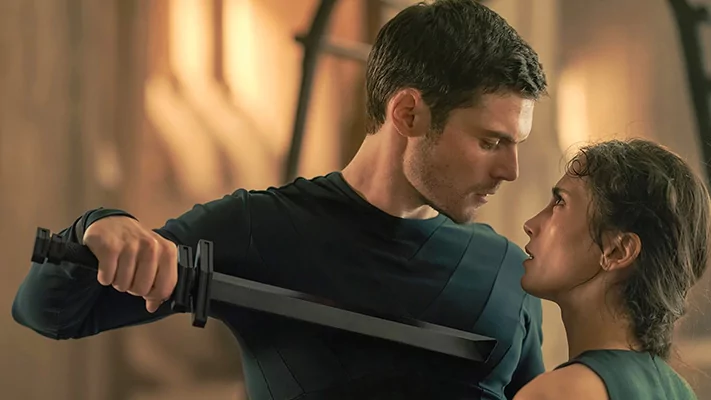Dune: Prophecy, HBO’s prequel series to the blockbuster films of the same name, opens with a quasi-cryptic epigraph about war set against an abstract, smoky monochrome backdrop — an implicit promise to the viewer that it will deliver more of the awesome, austere sturm-and-drang that made those films the most artistically successful fantasy adaptations since Peter Jackson’s Lord of the Rings trilogy.
It then immediately breaks that promise, burying the viewer, as did Dune adaptations past, until Denis Villeneuve’s films, under mountains of impenetrable voiceover exposition and overlit, 1990s-cable-TV-original cinematography. Gone is Frank Herbert’s original material. In its place is that of his son, Brian Herbert, author of an endless series of dull expository novels upon which Dune: Prophecy is loosely based. Gone is the writing of Villeneuve and his collaborators, who transformed a text thought largely unfilmable into smash hit films worthy of its enduring appeal, replaced by a rotating cast of network procedural veterans. And gone, most painfully, is cinematographer Greig Fraser, whose moody, intense palette brought Frank Herbert’s world to overpowering life, replaced by … a guy whose most recent feature credit is a 2011 ABC Family original film titled Cyberbully.

The Dune films, with a few notable exceptions, leave much beyond the basics of the book’s plot to the imagination. They instead crash wave after wave of symbolic, alien imagery over the viewer’s head, more visual experience than connect-the-dots palace intrigue. Dune: Prophecy opts for the Game of Thrones expositional approach but fails, badly, leaving the viewer both befuddled and without much to look at. With a nod in fairness to the years of yeoman’s work and experience this crew brings to the table, Dune: Prophecy is nadir television, a mannequin built from “prestige” television clichés and tropes draped shabbily in the trappings of Herbert’s — really, Herbert’s fils’s — fictional universe.
In a certain light, this is easy to excuse. The appeal of the Dune franchise is notoriously difficult to explain to the uninitiated (your author, full disclosure, was interviewed on the release of the most recent film earlier this year as a Dune “megafan”). Herbert’s prose is not particularly stylish, or even in places clear. Its message chafes harshly against epic science fiction and fantasy conventions — there are no heroes, and human effort and planning are futile, if not inherently suspicious. It borrows, in painfully out-of-date fashion, from Near and Far Eastern religious and aesthetic traditions, mashing them up with New Wave science fiction gizmos and notes of Teutonic militarism.
In other words: It’s incredibly difficult to make Dune work on the screen, to the point where even David Lynch called his 1984 adaptation “a failure” — he’s right, but its sheer weirdness makes it worth revisiting. The crew assembled to put together Dune: Prophecy never realistically had a chance, then. But one still can’t help wishing they had at least tried a bit harder to imitate Villeneuve’s miraculous blueprint.
The series follows the intrigues of the Bene Gesserit, a secretive cult of assassin psychic witches, er, of sorts, who scheme behind the scenes to shape galactic political outcomes. The action takes place 10,000 years before the events of the films, as the sect tries to establish its influence in the wake of a war that led the galaxy’s civilizations to ban the use of “thinking machines,” essentially computers, a formative event that gives the Dune universe much of its medieval flair.
That combination of subject matter (courtly intrigue) and setting (literal courts) invites the inevitable comparisons to HBO’s Game of Thrones. The series itself seems to be screaming for the comparison — most notably in the second episode, where one character reveals a crucial piece of plot-driving information in the middle of an utterly gratuitous sex scene, a practice that one Game of Thrones blogger immortally dubbed “sexposition.”
Your author is not among the new breed of media-watchers who deem all on-screen copulation immoral or contaminating, but here it is very obviously beside the point, and almost insulting to the viewer in its estimation of their interest — mine was already beginning to wane. The series’ plot is driven by two sisters from the Harkkonen family, antecedents of the novel’s primary antagonists, who scheme to solidify their control of the planet Arrakis via an arranged marriage that almost instantly goes wrong.
Despite a few heavy hitters’ valiant dramatic efforts to maintain interest in this cloak-and-dagger — including Emily Watson, Mark Strong, and an especially welcome Olivia Williams, likely best known to viewers as Miss Cross in Rushmore — the dynastic whispering inevitably fades into the background. The viewer is left desperate for any crumb of familiar Dune iconography and mythmaking, but what Dune: Prophecy delivers on this count is even more punishing than its paint-by-numbers procedural drama.
The Bene Gesserit, whose all-powerful abilities of mind control, detection, and prognostication are the basis for this series, as well as the central drama of the Dune films and books themselves, are thwarted in a shockingly dumb early twist. This is meant to bolster the threat posed by an antagonist who otherwise recalls the hapless titular hero of Owen Wilson’s forgotten 2008 comedy Drillbit Taylor. But it mostly leads the viewer to question why so much is invested in a faction that can barely carry out its own threats, breaking one of the most basic imaginable dramatic rules.
CLICK HERE TO READ MORE FROM THE WASHINGTON EXAMINER
In the same episode, one character is depicted undergoing “the agony,” a psychedelic rite meant to unlock a sort of limited omniscience about one’s ancestors. Arguably the climactic event of the novel Dune, the rite is depicted with a frightening religious intensity in Villeneuve’s films. Here, it becomes a gobsmackingly literal pantomime where the subject is clawed at by grey-clad extras who seem as if they’ve just wandered out of a roadside Halloween house, filmed in a nondescript grey glaze that recalls the low-budget Blumhouse horror films.
Dune: Prophecy had a troubled production dating back to 2019, when Villeneuve and the films’ co-writer, Jon Spaihts, were set to direct and write the pilot, respectively. Internet critics assailed the production for not involving enough women, and as time wore on to overlap with production for the cinematic Dune: Part Two, both men exited. Spaihts became eventually just the first of four consecutive showrunners before the series even aired. Given the headache and the show’s lukewarm, at best, critical reception, one imagines production company and Dune rights holder Legendary will be reticent to stake its intellectual property’s worth on this drab piece of paint-by-numbers “worldbuilding.” It’s probably for the best.
Derek Robertson co-authors Politico’s Digital Future Daily newsletter and is a contributor to Politico Magazine.























